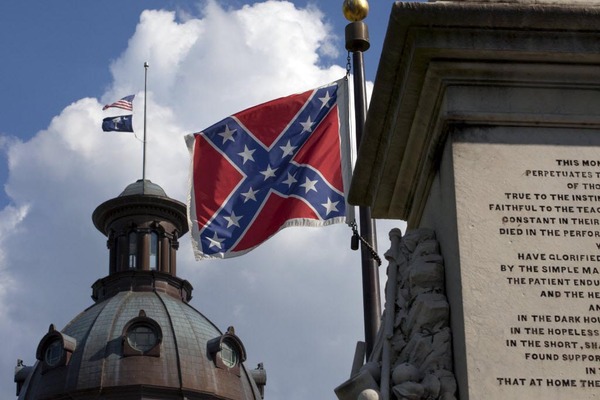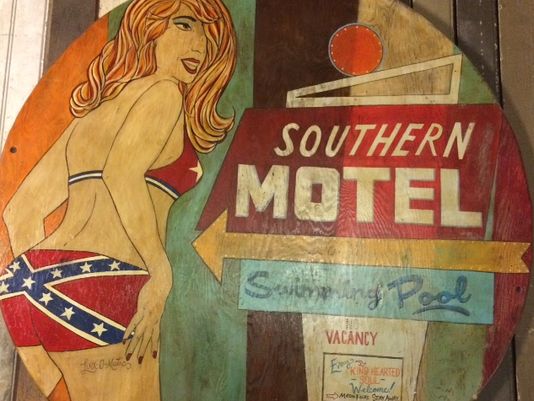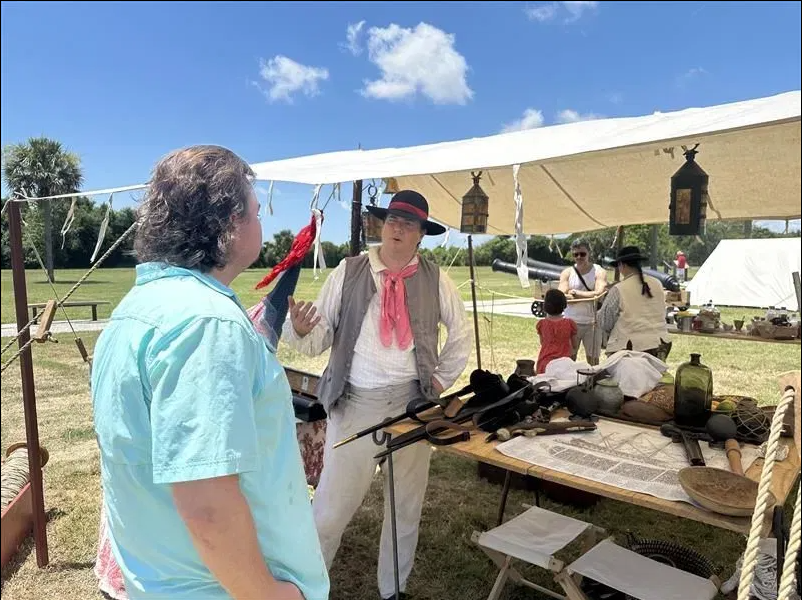SOUTH CAROLINA: Is State Ready to Remove Confederate Flag?
A bill to take down the Confederate battle flag in South Carolina may be ready in time for the state legislature’s January 2016 session, if at least one Republican lawmaker has his way.

The Confederate Flag on the grounds of the South Carolina State House flies at full staff while the U.S. and state flags are at half mast following the killing of nine black churchgoers in Charleston by a white gunman.
State Rep. Norman “Doug” Brannon (R-Spartanburg) has said he plans to introduce such a bill and file it as early as possible, likely in December, CBS News reported. The legislator adds his voice to the heated debate around the flag’s meaning and ties to white supremacy — a debate that has intensified following the deadly shooting at a historic black church in Charleston on Wednesday.
“When my friend was assassinated for being nothing more than a black man, I decided it was time for that thing to be off the Statehouse grounds,” Rep. Brannon said, referring to one of the nine victims, Rev. Clementa Pinckney, a state senator who was also the lead pastor at the Emanuel African Methodist Episcopal Church.
“[The flag] not just a symbol of hate, it’s actually a symbol of pride in one’s hatred,” Brannon added, according to the Associated Press.
The Battle Flag for the Army of Northern Virginia — often called the Confederate flag — has long divided the nation: some see it as a symbol of southern pride while others regard it as a reminder of slavery and racism, the Christian Science Monitor’s Sarah Casparireported.
Among those who join Brannon in the latter view are former 2012 presidential candidate Mitt Romney, who called the flag “a symbol of racial hatred” on Twitter; and 2016 Republican candidate Jeb Bush, who called on South Carolina to follow Florida’s example in taking down the flag.
“My position on how to address the Confederate flag is clear,” Mr. Bush, a former Florida governor, wrote in a post on his Facebook page. “In Florida, we acted, moving the flag from the state grounds to a museum where it belonged.”
Republicans in the running for the presidential primary contest in February have taken more careful positions.
South Carolina Sen. Lindsey Graham, among those with a hat in the ring,told CNN the flag does not belong in the debate around the Charleston church shooting.
“We’re not going to give this a guy [the shooter] an excuse about a book he might have read or a movie he watched or a song he listened to or a symbol out anywhere,” Sen. Graham said. “It’s him… not the flag.”
Texas Sen. Ted Cruz, another Republican hopeful, told the New York Times that the issue is “a question for South Carolina. And the last thing they need is people from outside of the state coming in and dictating how they should resolve it.”
“I understand the passions that this debate evokes on both sides,” Sen. Cruz added.
Besides its political complications, bringing down the flag also comes with legal and logistical issues, due to a South Carolina law that requires the approval of the full state legislature before the flag can be taken down.
Still, with Brannon supporting the flag’s removal, state lawmakers on both sides of the aisle may be on the way to finding common ground on the matter.
“I can’t stand across the street from that church, knowing what went on in there and why, and act like symbols don’t matter,” Rep. Todd Rutherford (D-Columbia), told the Post and Courier Friday. “That young man had a flag on his chest of hatred. He had the flag on his car of hatred. He believed on it, acted on it. And if South Carolina government is serious about it, we have to take that flag down.”
–csmonitor.com
###
SOUTH CAROLINA: State Froze Death Penalty Amid Drug Shortage
COLUMBIA, S.C. — Two days after the shooting deaths of nine people at a Charleston church, Republican Governor Nikki Haley made a bold public statement: The gunman “absolutely” should be put to death. But her state, though largely in favor of the death penalty, can’t secure one of the drugs needed for lethal injections and hasn’t executed an inmate since 2011.

SSOCIATED PRESS/POOL
Governor Nikki Haley of South Carolina has said the Charleston shooting suspect “absolutely” should be put to death if convicted.
Dylann Storm Roof, 21, is charged with nine counts of murder in Wednesday’s massacre. He appeared briefly before a judge Friday, and his next court appearance isn’t until October. Any potential execution order in the case would be years away.
Haley made her comments Friday on NBC’s “Today” show, but the governor has no power in Roof’s prosecution or sentencing.
South Carolina’s supply of pentobarbital, one of three drugs in the state’s lethal injection, expired in 2013. Bryan Stirling, head of the state correction department, has made it clear to legislators that his agency can’t buy any more. Forty-four people are on death row in the state.
All attempts to purchase more have failed — a nationwide problem. Some are trying to find new drugs and new sources for drugs because pharmaceutical companies have stopped selling them for executions and pharmacists are reluctant to expose themselves to possible harassment.
Stirling advocated this year for a bill that would keep secret the information of any company or pharmacist providing execution drugs, saying that should help secure them. But bills have stalled in both chambers, and opponents urged legislators not to vote for government secrecy.
The Supreme Court is considering the constitutionality of Oklahoma’s three-drug injection, with inmates arguing it doesn’t reliably produce unconsciousness and causes pain and suffering. State House Judiciary chairman Greg Delleney, a South Carolina Republican, has said he will probably wait for that decision before asking lawmakers to vote on the bill, though Stirling notes that his state uses a different drug.
Still, Delleney said, “I don’t see any urgency to get ahead of the Supreme Court.”
Even with the dozens of inmates on South Carolina’s death row, the next execution is probably five years away, according to Emily Paavola, executive director of South Carolina’s Death Penalty Resource and Defense Center, which believes the state’s death penalty is fraught with problems and advocates for reform.
Paavola has said the only way that would speed up is if an inmate who’s sentenced to die waives all appeals — an unlikely scenario.
Death row inmates can choose electrocution, but if a prisoner doesn’t want to die that way, the prisons agency could not carry out an execution order without the necessary drugs for a lethal injection, Stirling said.
Since lethal injection became an option in 1995, only three of 39 people executed have died by electrocution.
After the bills on drugmaker secrecy stalled, Representative Joshua Putnam, a Republican, introduced a proposal that would add death by a five-member firing squad to the state’s list of approved execution methods. Putnam said while there are cases in which lethal injection drugs didn’t work properly and caused pain, “we do know by firing squad you don’t feel anything.”
But Representative Joe Neal said that makes little sense.
“I can’t think of a more hideous spectacle than gunning down someone,” said Neal, a Democrat. “Whether people suffer or not depends on the aim of an unknown marksman.”
Putnam’s measure also would allow for execution by electrocution if the state doesn’t have the lethal injection drugs. Last month, Representative Mike Pitts, a Republican and retired police officer, introduced a bill that’s more straightforward. It would eliminate all references to a lethal injection option, leaving electrocution as the only method.
No action has occurred on either bill. But they can be taken up when the second year of a two-year legislative session resumes in January.
–bostonglobe.com
###
SOUTH CAROLINA: Confederate Statue Vandalized
CHARLESTON, S.C., June 22 (UPI) — A park statue honoring fallen Confederate soldiers in Charleston, S.C., was found spray-painted Sunday with graffiti reading “Black Lives Matter” and “This is the problem #racist.”
The graffiti also addressed South Carolina Gov. Nikki Haley and Charleston Mayor Joe Riley.
###
TENNESSEE: Nashville Restaurant Removes Confederate Flag
NASHVILLE, Tenn. — Nashville’s Acme Feed & Seed has removed a piece of artwork that features an image of the Confederate flag amid criticism aimed at the establishment and one of its investors, mayoral candidate Charles Robert Bone.
Bone had requested its removal after an anonymous Facebook page surfaced with a photo of him doctored to appear next to the artwork at issue — a painting inside the Lower Broadway restaurant and bar that includes a cartoon caricature of a woman wearing Confederate flag bikini bottoms.

This piece of artwork inside Acme Feed & Seed had come under fire but is now removed.
(Photo: Submitted)
“This is offensive and should have no place in Nashville!” the Web page reads.
Acme Feed & Seed owner Tom Morales confirmed its removal in a statement to The Tennessean on Saturday.
“In light of the recent events, Acme Feed & Seed has removed the piece of artwork so as not to confuse anyone about Acme’s, our investors’ and our supporters’ commitment to all people of Nashville,” Morales said.
He called the artwork “satirical commentary on Southern culture” from a local artist Shelia B. Ware, who has “renowned ‘tongue in cheek’ collections” at the Ryman Auditorium, the Gaylord Opryland Hotel and the Tennessee State Museum.
“It is unfortunate the full context and story behind Sheila B.’s art is failed to be recognized in this instance,” he said. “We apologize for any distress this may have caused.”
A “Boycott Acme” Facebook page, as well as a subsequent “remove the artwork” online petition, appeared online this past week and made its first post about Bone on Friday — one day after Bone rival Bill Freeman made controversial comments at the NashForward mayoral debate on the recent shooting inside an African-American church in Charleston, S.C. Freeman later took back his comments.
“I’m an investor in this restaurant and proud of it,” Bone said in a statement Friday. “We’ve created a lot of jobs and supported Nashville’s tourism economy. Acme has over 500 artifacts in it, and I’ve not seen this particular one.
“Anyone who knows me knows I don’t support any symbol, gesture or word that is offensive to any community. I’ve asked the operator to remove this one as I don’t want it representing Nashville, and anyone who knows me understands that. I appreciate this being called to my attention so I can address the issue openly.”
Bone, a Nashville attorney and entrepreneur, is one of multiple investors at Acme Feed & Seed, a Lower Broadway establishment that the mayoral candidate highlights in one of his television commercials.
The artist, who goes by Shelia B., issued her own statement that defended her work, which she described as “Nashville-centric” and dealing with issues and imagery primarily Southern in representation.
This particular Acme Feed & Seed piece shows a woman wearing a Confederate flag bikini bottom next to a Southern Motel sign advertising a swimming pool. It has an inscription that reads, “Every kind-hearted soul welcome! Mean folks stay away.”
“Anyone that has a vision, and not a set of blinders on, can view my artwork and see that there is a message that is not divisive,” she said. “I have a message of inclusion. It is social commentary, and anyone seeing my work as anything other than opposing a divisive culture is delusional and s***-stirring at best.”
Bone surrogate Rev. James “Tex” Thomas, prominent African-American pastor of North Nashville’s Jefferson Street Missionary Baptist Church, had offered a sharply worded statement the previous day accusing Freeman’s campaign of being responsible for the Facebook page that targeted Bone.
“I have known Charles Robert Bone and his family for decades, I know their character and I know their heart,” Thomas said.
“This accusation is obviously a misguided attempt by a flailing campaign to draw attention away from their own unfortunate, insensitive, out of touch mistakes. What is more telling is that this accusation is leveled by a Facebook group that was politicized after the Charleston massacre in attempt to capitalize on the situation. It saddens me that someone would stoop to this level instead of raising us up.
“I know that Charles Robert stands by our community, and he has proven this by his deeds over decades, and that is why I know that Charles Robert Bone is the right person to be our mayor now.”
At Thursday’s debate, Freeman said the Charleston massacre was “not necessarily about racial profiling” as he suggested that mental illness may have played a role as well. The next day Freeman sought to clarify his remarks, saying that the shooting was “obviously racially motivated” and that he hadn’t seen the comments from the murderer when he made his original remarks.
“I stand by my statement that people with mental illnesses should not be able to walk up and buy a gun without regulation,” Freeman also said.
Freeman campaign spokesman Kevin Teets said he hopes this is the end of the matter.
“The violence in Charleston should cause all of us to think about how we improve our communities, how we listen to each other and how we work for a better tomorrow,” Teets said in a prepared statement.
“I know Charles Robert personally and so does Bill Freeman,” he said. “We know Charles Robert to be a man of good character and someone who has open arms for everyone — no matter their color, their religion, their gender or their sexuality. Hopefully this is the end of the matter and we can get back to the issues that voters care about most deeply such as education, traffic and public safety. ”
thetennessean.com
###



